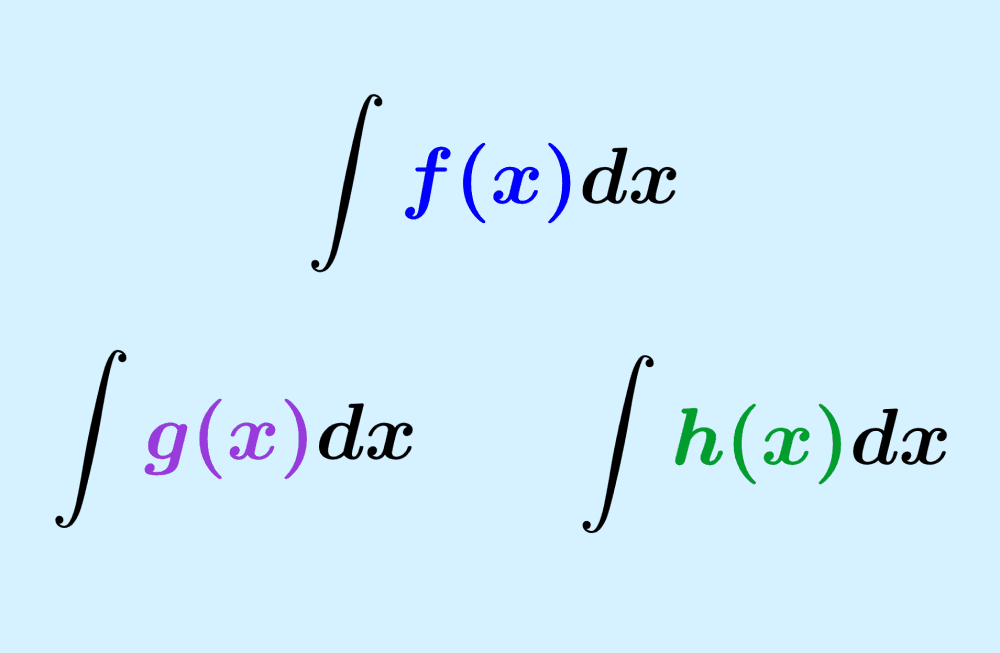The indefinite integrals of functions with numerical exponents can be solved by adding 1 to the exponent of each term, then we divide the term by the new exponent. Finally, we simplify the obtained expression and add the constant of integration.
In this article, we will look at some solved exercises of indefinite integrals. Then, we will explore some practice problems to apply what we have learned.
Process used to find the indefinite integral of a function
The indefinite integral of a function refers to the integral that is not evaluated with any limit and is expressed as a function of x and includes a constant of integration.
To obtain the indefinite integral of a function expressed with numerical exponents, we can use the following formula:
$$\int ax^n dx =\frac{ax^{n+1}}{n+1}+c$$
where, $latex n \neq -1$.
We can find the indefinite integral of a function by applying the following steps:
1. Write square roots or rational expressions using numerical exponents.
Note: An example would be writing $latex \sqrt{x}$ as $latex x^{\frac{1}{2}}$ or writing $latex \frac{1}{x^2}$ as $latex x^ {-2}$.
2. Add 1 to the exponents of each term of the function.
Note: A constant term can be thought of as multiplied by $latex x^0$, so by adding 1, we have $latex x^1=x$.
3. Divide each term by the new exponent.
That is, each term is divided by $latex n+1$.
4. Simplify the resulting integral and add the constant term $latex c$.
Why do indefinite integrals have a constant of integration?
The indefinite integrals have a constant of integration since the derivative of a constant term is equal to zero. Then, it is possible that we don’t take into account a constant term when integrating the function.
For example, suppose we have the function $latex y=x^2$. When we differentiate it, we have $latex \frac{dy}{dx}=2x$. However, when we differentiate $latex y=x^2+1$ and $latex y=x^2+2$, we also get $latex \frac{dy}{dx}=2x$.
That is, without additional information we don’t know if the original function contained a constant term or not. For this reason, we write $latex y=x^2+c$, where $latex c$ is the constant of integration.
To find the specific value of the constant of integration, we need additional information about the integrated function. For example, in many cases, knowing the coordinates of a point through which the integrated function passes is sufficient.
Indefinite integrals – Examples with answers
EXAMPLE 1
Find the indefinite integral of the function $latex f(x)=3x^2$.
Solution
We start by forming an integral with the given function:
$latex \int 3x^2 dx$
Now, we can solve this integral by applying the following:
- Add 1 unit to the exponent of x.
- Divide the term by the new exponent (n+1).
- Add the constant of integration.
Therefore, we have:
$$\int 3x^2 dx=\frac{3x^3}{3}+c$$
$$\int 3x^2 dx=x^3+c$$
EXAMPLE 2
If we have the function $latex f(x)=12 x^5$, what is its indefinite integral?
Solution
Similar to the previous example, we start by forming the integral with the given function:
$latex \int 12x^5 dx$
Now, we apply the following:
- Increase the exponent of x by 1.
- Divide the expression by the new exponent.
- Add the constant of integration.
Therefore, we have:
$$\int 12x^5 dx=\frac{12x^6}{6}+c$$
$$\int 12x^5 dx=2x^6+c$$
EXAMPLE 3
Find the indefinite integral of the function $latex f(x)=\frac{1}{x^3}$.
Solution
In this case, we have a rational function. Then, we can use the laws of exponents to write as follows:
$$f(x)=\frac{1}{x^3}=x^{-3}$$
Now, we can form the integral with this function:
$latex \int x^{-3} dx$
When we integrate the function, we have:
$$\int x^{-3} dx=\frac{x^{-2}}{-2}+c$$
$$\int x^{-3} dx=-\frac{1}{2x^2}+c$$
EXAMPLE 4
What is the indefinite integral of $latex f(x)=-\frac{1}{x^5}$?
Solution
To facilitate the problem, we start by writing the function as follows:
$$f(x)=-\frac{1}{x^5}=-x^{-5}$$
Forming the indefinite integral, we have:
$latex \int -x^{-5} dx$
Solving the integral, we have:
$$\int -x^{-5} dx=-\frac{x^{-4}}{-4}+c$$
$$\int -x^{-5} dx=\frac{1}{4x^4}+c$$
EXAMPLE 5
Find the indefinite integral of $latex f(x)=x^2-5x+3$.
Solution
Forming the indefinite integral with the given function, we have:
$latex \int x^2-5x+3 dx$
In this case, we have 3 terms. However, we can find its integral by applying the following to each term:
- Add 1 to the exponent of x of each term.
- Divide each term by the new exponent.
Then, when we apply this and add the constant of integration, we have:
$$\int x^2-5x+3 dx=\frac{x^3}{3}-\frac{5x^2}{2}+3x+c$$
EXAMPLE 6
Find the indefinite integral of $latex f(x)= 2x^6+\frac{8}{x^5} $.
Solution
We start by writing the function as follows:
$$f(x)=2x^6+\frac{8}{x^5}$$
$$f(x)=2x^6+8x^{-5}$$
Forming the indefinite integral, we have:
$latex \int 2x^6+8x^{-5} dx$
Solving, we have:
$$\int 2x^6+8x^{-5} dx=\frac{2x^7}{7}+\frac{8x^{-4}}{-4}+c$$
$$\int 2x^6+8x^{-5} dx=\frac{2x^7}{7}-\frac{2}{x^4}+c$$
EXAMPLE 7
Find the indefinite integral of the function $latex f(x)=3\sqrt{x}-4$.
Solution
We have a square root, so we use the laws of exponents to write as follows:
$$f(x)=3\sqrt{x}-4=3x^{\frac{1}{2}}-4$$
Forming an integral with the given function, we have:
$$\int 3x^{\frac{1}{2}}-4 dx$$
Solving this, we have:
$$\int 3x^{\frac{1}{2}}-4 dx=\frac{(2)3x^{\frac{3}{2}}}{3}-4x+c$$
$$=2x^{\frac{3}{2}}-4x+c$$
$$=2\sqrt{x^3}-4x+c$$
EXAMPLE 8
If we have the function $latex f(x)=\sqrt{x}+\frac{1}{\sqrt{x}}$, what is its indefinite integral?
Solution
Let’s use the laws of exponents to write the function as follows:
$$f(x)=\sqrt{x}+\frac{1}{\sqrt{x}}$$
$$f(x)=x^{\frac{1}{2}}+x^{-\frac{1}{2}}$$
Forming an integral with this function, we have:
$$\int x^{\frac{1}{2}}+x^{-\frac{1}{2}} dx$$
When solving, we have:
$$\int x^{\frac{1}{2}}+x^{-\frac{1}{2}} dx=\frac{2x^{\frac{3}{2}}}{3}+2x^{\frac{1}{2}}+c$$
$$=\frac{2\sqrt{x^3}}{3}+2\sqrt{x}+c$$
EXAMPLE 9
What is the indefinite integral of $latex f(x)=4\sqrt{x}-\frac{2}{3x^2}$?
Solution
Let’s write the function as follows using the laws of exponents:
$$f(x)=4\sqrt{x}-\frac{2}{3x^2}=4x^{\frac{1}{2}}-\frac{2}{3}x^{-2}$$
Forming an indefinite integral with the function, we have:
$$\int 4x^{\frac{1}{2}}-\frac{2}{3}x^{-2} dx$$
Solving this, we have:
$$\int 4x^{\frac{1}{2}}-\frac{2}{3}x^{-2} dx=\frac{(2)4x^{\frac{3}{2}}}{3}-\frac{2x^{-1}}{3(-1)}+c$$
$$=\frac{8}{3}\sqrt{x^3}+\frac{2}{3x}+c$$
EXAMPLE 10
Find the indefinite integral of $latex f(x)=2\sqrt[3]{x}- \frac{6}{\sqrt{x}}$.
Solution
We start by writing the function as follows:
$$f(x)=2\sqrt[3]{x}- \frac{6}{\sqrt{x}}$$
$$f(x)=2x^{\frac{1}{3}}- 6x^{-\frac{1}{2}}$$
When we form the integral, we have:
$$\int 2x^{\frac{1}{3}}- 6x^{-\frac{1}{2}} dx$$
By solving, we have:
$$\int 2x^{\frac{1}{3}}- 6x^{-\frac{1}{2}} dx=\frac{(3)2x^{\frac{4}{3}}}{4}-(2)6x^{\frac{1}{2}}+c$$
$$=\frac{3}{2}\sqrt[3]{x^4}-12\sqrt{x}+c$$
Indefinite integral – Practice problems


If we have $latex F(x)=\int f(x)dx$, find the value of $latex F(4)$ for: $$f(x)= 2x^3-2x^2+2x^{\frac{1}{2}}$$
Write the answer in the input box.
See also
Interested in learning more about integrals of functions? You can look at these pages:




